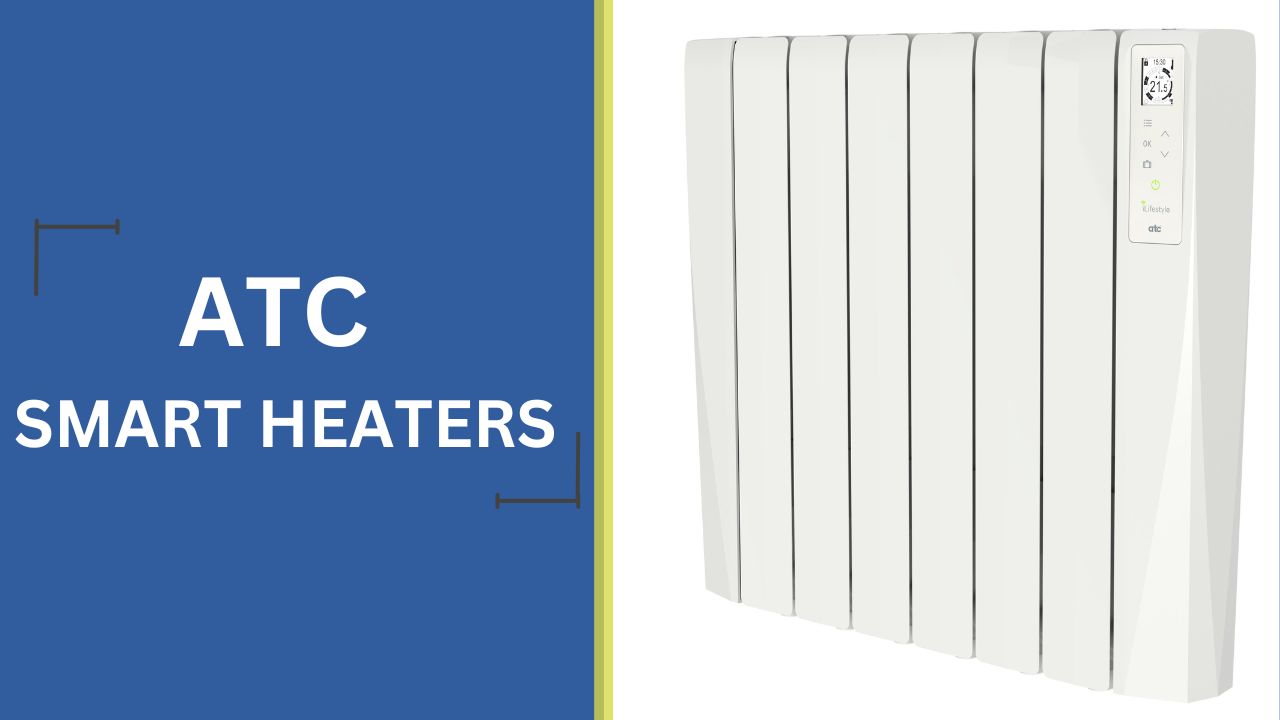The Ultimate Guide to Smart WiFi Heaters: Revolutionizing Home Heating

As heating costs continue to climb yearly, finding an efficient and cost-effective solution is more crucial than ever.
In 2021, the average electricity bill for UK residents surged to £764, reflecting a 7.5% increase from the previous year (Ofgem). This trend is expected to persist, prompting many homeowners to seek smarter ways to manage their energy consumption.
Enter the smart WiFi heater—a revolutionary device that offers enhanced control, improved energy efficiency, and significant cost savings. With the ability to monitor and adjust your heating remotely, smart WiFi heaters are quickly becoming a must-have for modern households.
Let's explore how these advanced heating systems can transform your home and help you avoid rising energy costs.
What Is a Smart WiFi Heater?

Imagine controlling your home's heating system with just a tap on your smartphone or a simple voice command. This is the convenience that a smart WiFi heater brings to the table. These modern heaters connect seamlessly to your WiFi network, offering superior functionality and ease of use compared to traditional heaters.
Smart WiFi heaters allow you to remotely control all temperature-related aspects of your home, ensuring you can always return to a warm and cosy environment. By downloading a corresponding app on your smartphone, you can access various controls, from setting temperatures to scheduling heating periods. Some models even include wall panels for additional convenience.
Key benefits of smart WiFi heaters include:
- Energy Consumption Tracking: Monitor your energy use in real-time, helping you identify ways to save on your electricity bill (Energy.gov).
- Customisable Schedules: Set heating schedules that align with your daily routine, ensuring optimal comfort while minimising energy waste (TechRadar).
- Timers for Operation: Automatically turn your heater on or off at specific times, enhancing energy efficiency.
Whether you have a small apartment or a large home, a smart WiFi heater fits your needs. These heaters come in various sizes and configurations, making it easy to find the perfect match for your space. Compact models are ideal for smaller locations, while more complex systems can handle larger heating requirements.
Before purchasing a smart WiFi heater, assess your heating needs to choose the best option for your home. This will ensure that you maximise the benefits of smart heating technology.
What Are Some Important Characteristics of Smart Heaters?

Smart WiFi heaters are packed with features designed to enhance your heating experience and improve energy efficiency. Here are some key characteristics that make these heaters stand out:
- App Control: Most smart heaters have a dedicated app that allows you to control the heater from your smartphone, tablet, or other connected devices. This app-based control allows remote operation without manual configuration.
- Manual On/Off Button: If you prefer traditional control, these heaters often include a manual on/off button.
- Temperature Modification: Easily adjust the temperature with a slider function, ensuring precise control over your heating.
- Optimal Temperature Setting: Set and maintain the optimal temperature for your comfort.
- Display Panel: A clear display shows the current room temperature, making it easy to monitor and adjust settings as needed.
- Scheduling and Scene Settings: Create specific heating schedules for different rooms and scenarios, ensuring efficient energy use.
- Central Hub Management: If you have multiple heating systems, a central hub allows for seamless management of all devices.
- Network Connectivity: Ensure a stable connection to your home network for uninterrupted control.
- Intelligent Machine Learning: Some smart heaters use machine learning to adjust temperature settings based on your building’s needs, optimising energy use and comfort (Energy.gov).
When selecting a smart WiFi heater, be sure to check for unique features that may be specific to certain models. Always review the specifications provided by the manufacturer to ensure you’re getting a heater that meets your specific requirements.
By understanding these characteristics and leveraging the advanced features of smart WiFi heaters, you can significantly enhance your home’s heating efficiency and enjoy greater control over your energy consumption.
What Makes a Heater Smart?

Smart WiFi heaters stand apart from their traditional counterparts due to their advanced capabilities and innovative technology. Unlike standard heaters, which may offer basic functionalities, smart WiFi heaters incorporate cutting-edge features that provide superior control and efficiency.
One of the most significant distinctions is the integration of machine learning. Smart WiFi heaters use this technology to learn your home’s temperature patterns and adjust settings automatically to optimise comfort and energy use (Energy.gov). Standard heaters lack this intelligent capability.
Additionally, smart WiFi heaters offer unparalleled connectivity. These devices can be operated via a smartphone, tablet, or virtual home assistant, allowing for seamless control from anywhere. You can even use voice commands to adjust your heating, making it incredibly convenient (TechRadar).
Here are some standout features that make a heater smart:
- Automatic Adjustments: Smart heaters monitor the room’s temperature and make automatic adjustments to maintain desired settings without any manual input. This ensures that your home is always at the perfect temperature without wasting energy.
- Multi-Room Control: Many smart WiFi heaters allow you to create separate heating zones within your home. For instance, you can keep your living room warm while reducing the temperature in unused rooms, maximising efficiency.
- Water Heating Integration: Some smart heaters also manage water heating, ensuring that only the necessary amount of water is heated. This prevents energy waste and reduces your overall heating costs.
- Geofencing and Motion Sensors: Advanced models come equipped with geofencing capabilities and motion sensors to detect occupancy. These features enable the system to start heating a room when it is occupied and conserve energy when it is not, ensuring no heat energy is wasted.
- Safety Features: Many smart WiFi heaters include safety mechanisms to protect your home’s infrastructure from heat damage, ensuring long-term reliability.
Another notable feature is energy tracking. Smart WiFi heaters continuously monitor and record your energy consumption, providing detailed insights that help you optimise settings for greater efficiency. This level of precision is not available with conventional heaters (Techstack).
Do Smart WiFi Heaters Save Energy?

Smart heaters are renowned for their energy-saving capabilities. According to various studies, smart heating systems can help reduce energy bills by approximately 6% (ScienceDirect). While this figure might seem modest, it accumulates over time, resulting in significant long-term savings.
Homeowners using smart WiFi heaters can expect to save between 10-20% on their energy bills, depending on their usage patterns and climate conditions. Those in colder climates, who use heating more frequently, may see even greater savings.
Smart WiFi heaters provide precise control over your heating systems, allowing you to optimise energy consumption in ways that are not possible with traditional heaters. Accurate temperature readings ensure efficient heating, eliminating the inefficiencies of conventional systems.
As you gain better control over your heating, the savings will become more apparent on your energy bills. Even small initial savings will accumulate over time, making smart heaters an attractive investment for households focused on long-term efficiency and cost reduction.
How to Create Zoning With Smart WiFi Heaters

Zoning is an excellent way to optimise the efficiency of your heating system. By dividing your home into different zones, you can adjust and moderate the temperature requirements for various living spaces. For instance, you might prefer a cooler temperature in the bedroom at night while keeping the living room warm throughout the day during winter.
With smart WiFi heaters, creating zoning settings is straightforward and highly effective. You can set unique temperature levels for each zone, ensuring comfort and efficiency.
Traditionally, zoning required a more complex setup involving multiple heaters and manual temperature management for each room. This method was costly, energy-inefficient, and inconvenient as it involved manually operating multiple heaters throughout your home.
Zoning With Smart Heaters
Smart heaters simplify the process of zoning. These advanced heaters often come with sensors that you can place in different sections of your home. These sensors are connected to a central management system, which works alongside your wireless network.
Here’s how it works:
- Sensor Placement: Place sensors in each area where you need heating. These sensors will send data about the room’s temperature levels back to the central system.
- Data Collection: Over time, the smart heater collects data on temperature patterns and stores this information in a database.
- Machine Learning: Using the collected data, the heating unit adjusts temperatures automatically to match your comfort levels. This ensures each zone is heated efficiently based on your preferences (CNET).
- Custom Schedules: Based on your routines, the system can suggest or automatically implement heating schedules. For example, it might heat your living room during the day and your bedroom at night.
These schedules help fine-tune your heating system’s performance. You can rely on the machine-learned schedules or make manual adjustments for even more efficient heating. For instance, you can program the heater to operate only when a guest room is occupied.
By implementing zoning with smart WiFi heaters, you can significantly improve your home’s heating efficiency, reduce energy consumption, and enjoy customised comfort in every room.
What Are the Best Smart Heaters on the Market?
When it comes to smart heaters, finding a reliable and efficient option can be overwhelming due to the wide variety available. At Meteor Electrical, we pride ourselves on offering a selection of high-quality, energy-efficient smart heaters from ATC. These heaters are designed to provide both convenience and comfort without compromising on performance. Here are some of the best smart heaters you can find at Meteor Electrical:

1. 500W ATC iLifestyle Smart Radiator
The 500W ATC iLifestyle Smart Radiator is an award-winning, oil-filled electric radiator that is perfect for those new to smart heating systems. This ATC heater is equipped with Wi-Fi control capabilities, allowing you to manage your heating settings without the need for an external network.
Key features include:
- Aluminum Fins: Ensures optimal heat transmission.
- Three Modes: Eco, comfort, and frost modes to suit varying temperature control needs.
- Compact Design: Ideal for smaller spaces or as an introductory smart heating solution.
2. 1000W ATC iLifestyle Smart Radiator
For a mid-range option, the 1000W ATC iLifestyle Smart Radiator is an excellent choice. This model offers the same capabilities as the 500W radiator but is suitable for mid-sized to larger homes.
Highlights include:
- Wi-Fi Compatibility: Provides extensive control over your heating system through your home network.
- Enhanced Heating Capacity: Perfect for larger areas needing more robust heating solutions.
- Home Automation Integration: A great starting point for building a smart home system.
3. 1800W ATC iLifestyle Smart Radiator
If you need a smart heater with higher heat output, the 1800W ATC iLifestyle Smart Radiator is the ideal product. Like other ATC heaters, it offers Wi-Fi control, allowing you to operate the heater from anywhere.
Key features:
- Precision Control: Offers precise temperature control with an accuracy of 0.2 degrees Celsius.
- Large Display Panel: Easy-to-read display for monitoring and adjusting settings.
- Voice Command Integration: Compatible with smart home assistants for convenient voice control.
Are you struggling to choose the right smart radiator? Check out our blog on the Best Smart Heaters for more insights and recommendations!
Why Choose ATC Smart Heaters?
ATC heaters are not only efficient but also user-friendly and packed with advanced features that make them stand out in the market. Whether you need a compact unit for a small room or a powerful radiator for larger spaces, ATC has a solution tailored to your needs. Visit Meteor Electrical to explore our full range of smart heaters and find the perfect fit for your home.
Want to learn more about ATC heaters, check out this helpful video!
Conclusion
Smart WiFi heaters are transforming the way we manage and enjoy home heating. With their advanced features, such as precise temperature control, energy consumption tracking, and the convenience of remote operation, these heaters offer an efficient and modern solution to rising heating costs. At Meteor Electrical, we are proud to provide a range of high-quality ATC smart heaters designed to meet diverse heating needs and enhance home comfort.
Whether you're looking to save on your energy bills, build a smart home, or simply ensure your home is cosy during the colder months, ATC's smart heater range provides the perfect solution. Don't let the winter chill catch you unprepared—explore our selection of smart heaters and make the smart choice for your home heating needs.
For more information about choosing the right heater and preparing your home for winter, visit our blog on the Best Smart Heaters. Trust Meteor Electrical to provide you with the best heating solutions to keep you warm and comfortable all season long.
FAQ: Smart WiFi Heaters
1. What is a smart WiFi heater?
A smart WiFi heater is a modern heating solution that connects to your home's WiFi network, allowing you to control your heating system remotely using a smartphone, tablet, or virtual assistant. These heaters offer advanced features such as energy consumption tracking, customisable heating schedules, and precise temperature control.
2. How do smart WiFi heaters save energy?
Smart WiFi heaters save energy by allowing precise control over your heating settings. Features like programmable schedules, real-time energy tracking, and intelligent machine learning help optimise heating efficiency, reducing overall energy consumption and lowering your electricity bills.
3. Can I control my smart heater with my smartphone?
Yes, most smart WiFi heaters come with a corresponding app that you can download on your smartphone. This app allows you to control the heater remotely, set schedules, adjust temperatures, and monitor energy usage.
4. Are smart WiFi heaters compatible with home automation systems?
Yes, many smart WiFi heaters are compatible with home automation systems. They can integrate with virtual assistants like Amazon Alexa and Google Assistant, enabling voice control and seamless interaction with other smart devices in your home.
5. What are the benefits of zoning with smart WiFi heaters?
Zoning allows you to create separate heating areas within your home, each with its own temperature settings. This customisation ensures that only the rooms in use are heated, enhancing comfort and energy efficiency. Smart WiFi heaters use sensors and machine learning to manage these zones effectively.
6. Do smart heaters require professional installation?
Most smart WiFi heaters are designed for easy installation and can be set up by homeowners without professional assistance. However, for larger or more complex systems, consult a professional to ensure optimal performance.
7. Where can I buy smart WiFi heaters?
You can purchase high-quality smart WiFi heaters from Meteor Electrical. We offer a range of ATC smart heaters that combine efficiency, convenience, and advanced features to meet your heating needs. Visit our online store to explore our selection.

